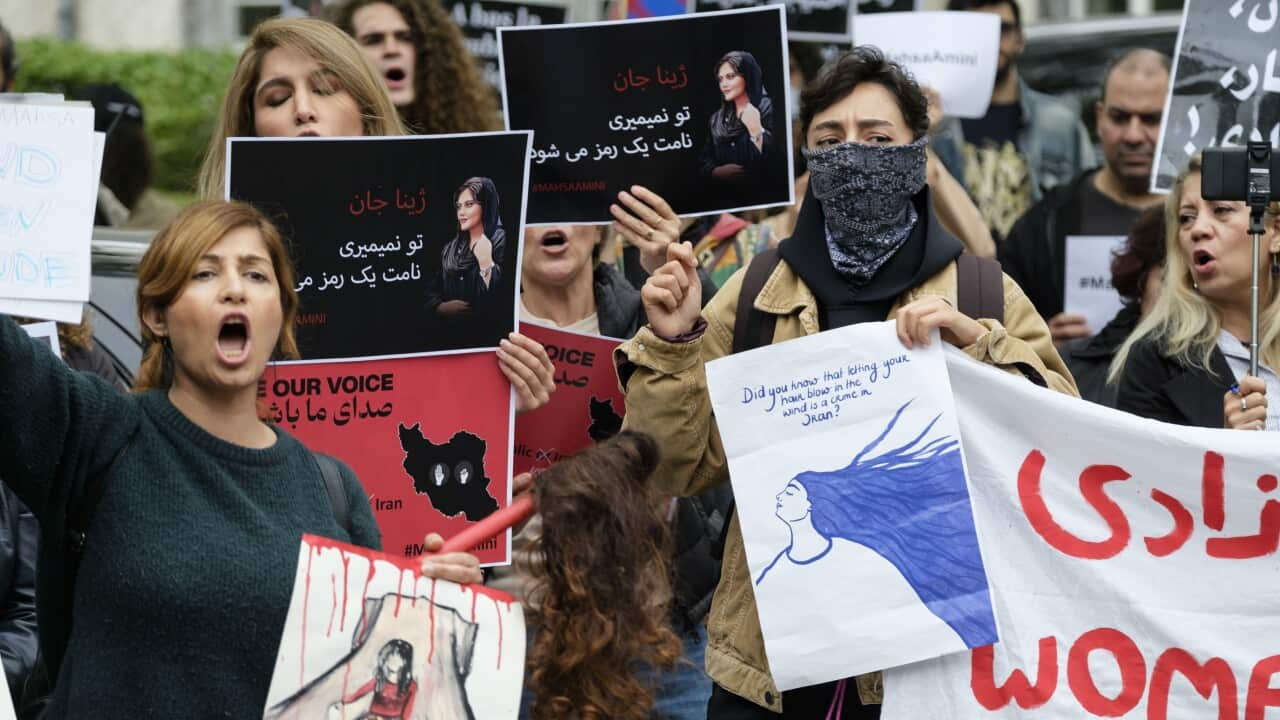KEY POINTS:
- A Greens Senator has called for the release of two Iranian men on death row.
- Senator Barbara Pocock has also called for the Iranian Revolutionary Guard to be labelled terrorists.
- Australian Iranian group Freedom for Iran echoes the calls.
Iranian Australians have praised Greens Senator Barbara Pocock for calling on the federal government to recognise the Iranian Revolutionary Guard as terrorists.
Ms Pocock is also calling for the release of two Iranian men, who have been sentenced to death for protesting.
While they say it's unlikely the Iranian government will accept the request, Iranian activists believe international pressure can help their plight.
Iranian Australian Rana Dadpour told SBS News that international pressure could make the Iranian government think twice before executing dissidents.
"We've seen a few times that the regime in Iran stepped backwards and didn't execute some people that are 'supposed' to be executed only because of this international coverage and amplifying their voices," she said.
Ms Pocock is requesting the release of Arshia Takdastan, 18, and Javad Rouhi, 35, who were both sentenced to death on 3 January for protesting.
"I would be in jail — many South Australian citizens would be in jail — if that was the test," Ms Pocock told SBS News.
"No proper evidence, a false confession, and just for participating in a civic protest."
Ms Pocock called on the Australian government to "take action" and "increase sanctions" on the Iranian government.
"We need to declare the Islamic Revolutionary Guard a terrorist organisation," she said.
"They are acting in ways which are so punitive against citizens who have committed no wrong."
The Islamic Revolutionary Guard Corps (IRGC) is a branch of the Iranian Armed Forces founded with the intention of protecting the country's Islamic republic political system.
The IRGC is designated as a terrorist organisation by the governments of Bahrain, Saudi Arabia and the United States.
Ms Pocock said she hasn't made any financial or visa sponsorship requests but "would consider it" based on advice from the South Australian Iranian community.
Ms Dadpour said the advocacy was a "great initiative" and is pleased the support for imprisoned Iranian activists is receiving "bipartisan support".
On Wednesday, Liberal MP Keith Wolahan wrote a letter to the Iranian embassy in Canberra where he says he "pleaded for mercy to be shown".
"It shows us that it's going to be a bipartisan act, and not limited to a specific party," Ms Dadpour said.
"That's good because we think, as Iranian Australians, this is a human rights issue, not a party issue."
So-called "political sponsorship" of Iranian prisoners has also come from teal independent Sophie Scamps.
She called for the release of Saeed Yaghouni, who was sentenced to death on 9 January for protesting.
On 9 January, a 30-year-old Iranian man with family in Australia, Majid Kazemi, was sentenced to death for his alleged involvement in the deaths of three government officials during Woman Life Freedom protests.
Mr Kazemi denies the charges, and told his family members that he was tortured into giving a false confession.
"They beat [us] again, and we were told to say these in court, all of it under torture. I had no gun and committed nothing. Under torture, I said ‘yes’ to everything,” Mr Kazemi said in an audio clip.

Iranian protesters Mohammad Mehdi Karami (left) and Seyed Mohammad Hosseini, who were executed earlier this month. Source: Getty / Ludovic Marin
In early January, protester Mohammad Mehdi Karami was hanged alongside Seyyed Mohammad Hosseini.
The protests, which demand greater freedom for Iranians from the government, were sparked after the death of 22-year-old Iranian Kurdish woman Mahsa Amini.
Ms Amini died in police custody after she was arrested for not wearing a hijab.
, 2022, that at least 448 people including 60 children and 29 women had been killed in the ongoing nationwide protests.
The Iranian embassy in Canberra has been contacted for comment.











